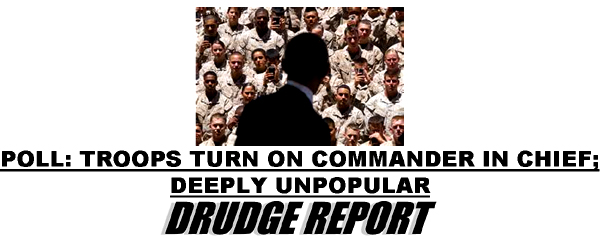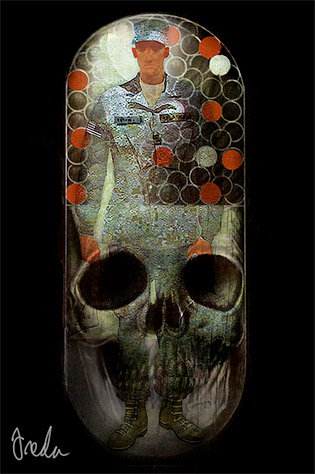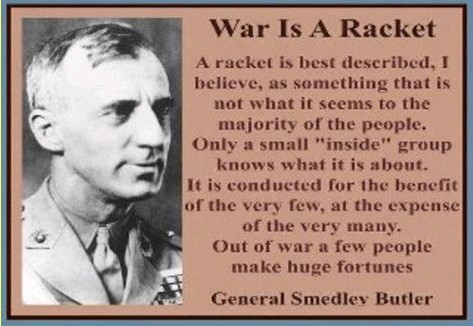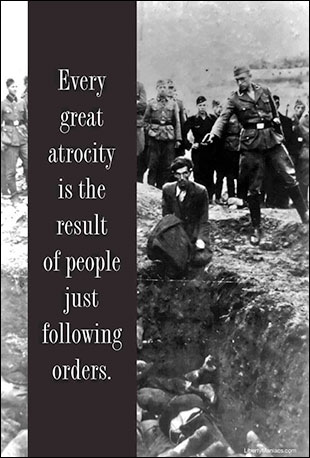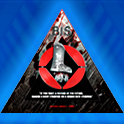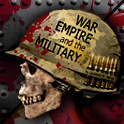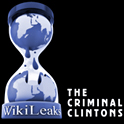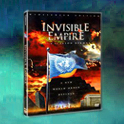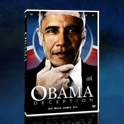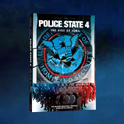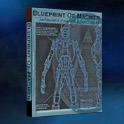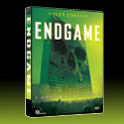welcome
|
|||||||||
"WAR IS A RACKET!" To summarize: Three steps must be taken to smash the war racket. #1 : We must take the profit out of war. # 2 : We must permit the youth of the land who would bear arms to decide whether or not there should be war. # 3 : We must limit our military forces to home defense purposes." -- Major General Smedley Butler --
The Crime Of Aggression: Condemned By The Law Of Nature And Nature’s God The Crime of Aggression is the most serious crime a nation can commit. The condemnation of this crime is rooted in both Natural and Biblical Law. The preparation for committing this crime almost caused David his kingdom. In judgment upon David for planning this crime, God destroyed tens of thousands of David's fighting men, and had David not repented, the nation of Israel itself would have been destroyed.
In this DVD, Dr. Baldwin explains this almost forgotten and extremely important doctrine. This is a message you will likely hear nowhere else.
LINKS :
The Truth About U.S. Air Strikes on Syria With Syrian Girl Published on Sep 24, 2014 Is the U.S. bombardment of Syria really just about targeting ISIS? Facebook @ https://www.facebook.com/paul.j.watso... https://www.youtube.com/user/SyrianGi...
Ron Paul What the Media Won't Report About Malaysian Air MH17 Published on Jul 22, 2014 Ron Paul - What the Media Won't Report About Malaysian Air MH17
Malaysian Flight False Flag Evidence Revealed by Infowars.com | July 20, 2014
Less than 24 hours after the devastating attack that downed Malaysian Airlines Flight MH17, Neocons and their state-run media would have us believe the case is closed…before an investigation has even been launched. We break down the repetitive false-flag narrative. LINK : False Flag Event
Joe Biden’s Son Appointed to Board of Ukraine’s Largest Gas Producer Global elite do not disguise efforts to gobble up Ukraine’s natural resources Kurt Nimmo Hunter Biden, the son of Vice President Joe Biden, will lead the legal team of Burisma Holdings, the largest natural gas producer in Ukraine. According to The West Wire News, Burisma Holdings is a considerable player within the Ukrainian natural gas and oil industry. It holds licenses covering the Dnieper-Donets, Carpathian and Azov-Kuban basins and has considerable reserves and production capability.
Biden is a lawyer with insider connections to the financial industry and government. In addition to holding directorship for the U.S. Global Leadership Coalition and The Center for National Policy, he sits on the Chairman’s Advisory Board for the National Democratic Institute (NDI). The NDI is a project of the National Endowment for Democracy (NED), the taxpayer funded organization that does what the CIA did covertly 25 years ago, according to one of its founders, Alan Weinstein. For more on the role played by NDI, NED, George Soros and the State Department on the overthrow of the elected government of Ukraine and the installation of the current junta led by banker Arseniy Yatsenyuk, see our Nuland Audio Reveals State Department Role in Undermining Ukraine and Wayne Madsen’s Crisis in the Ukraine: USAID Support for Destabilization of Russia. In March J.P. Sottile wrote about the economic interests of large transnational corporations in Ukraine. In addition to corporate agricultural giant Cargill’s buyout of UkrLandFarming, the world’s eighth-largest land cultivator and second biggest egg producer, Monsanto has expressed a “commitment to Ukraine” and “the importance of creating a favorable environment that encourages innovation and fosters the continued development of agriculture.” The effort to improve the investment climate for large multinational corporations on the Russian border is spearheaded by the U.S.-Ukraine Foundation, a non-profit NGO funded in part by ExxonMobil, Coca-Cola and Raytheon. In April Hunter’s father trekked to Ukraine to show support for the junta led in part by fascists and ultra-nationalists. “There are currently ongoing threats to Ukraine’s sovereignty and territorial integrity, and the most effective response to that is for all of Ukraine to pull together,” an Obama administration said prior to Biden’s mission. Beyond the standard rhetorical flourishes about democracy and freedom, Biden Senior’s trip was about securing a proper investment climate in Ukraine. From The Washington Post on April 21:
Obama’s Former Foreign Policy Adviser Said – In 1997 – that the U.S. Had to Gain Control of Ukraine Washington’s Blog The Battle for Ukraine Was Planned in 1997 … Or Earlier Neoconservatives planned regime change throughout the Middle East and North Africa 20 years ago. Robert Parry correctly points out that the Neocons have successfully “weathered the storm” of disdain after their Iraq war fiasco.But the truth is that Obama has long done his best to try to implement those Neocon plans. Similarly, ever since the Soviet Union collapsed in 1991, the U.S. has pursued a strategy of encircling Russia, just as it has with other perceived enemies like China and Iran.
Regarding Ukraine, Brzezinski said (hat tip Chris Ernesto):
And now Obama is pushing us into a confrontation with Russia over Ukraine and the Crimea. As Ernesto notes:
In other words, Obama is following the same old playbook that the Neocons have been pushing for more than a decade. This article was posted: Sunday, March 16, 2014 at 8:44 am
The Fall of Iraq - What You Aren't Being Told Iraq is descending into chaos, but not for the reasons you're being fed by the politicians and the mainstream media. Sources and full transcript: http://scgnews.com/the-fall-of-iraq-what-youre-not-being-told
WHERE DID ISIS GET THE WEAPONS? : BENGHAZIGATE
The Geopolitics of World War III Published on Sep 11, 2014 The real reason Russia and Syria are being targeted right now
Who Is REALLY Behind ISIS? Published on Sep 26, 2014 SHOW NOTES AND MP3: http://www.corbettreport.com/?p=12386 As bombs start dropping in Syria and Iraq, the world is once again being asked to cower in fear of a shadowy terror group that most people hadn't heard of just a few months ago. But even the most cursory examination of ISIS's past, its connections, and the actors populating it reveal a very different story than the one we are being asked to believe in. Fake terrorists. Foreign backers. False flags. Meet the new boogeyman, same as the old boogeyman.
Obama's Military Approval Rating
Jakari Jackson reports: FBI SAYS ’S WEST CHESTER BARTENDER PLANNED TO POISON HIM LAWMAKER REINTRODUCES CISPA “CYBERSECURITY” BILL
September 17, 2008 by Dahr Jamail Aside from the Iraqi people, nobody knows what the U.S. military is doing in Iraq better than the soldiers themselves. A new book gives readers vivid and detailed accounts of the devastation the U.S. occupation has brought to Iraq, in the soldiers' own words. Winter Soldier Iraq and Afghanistan: Eyewitness Accounts of the Occupation, published by Haymarket Books Tuesday, is a gut-wrenching, historic chronicle of what the U.S. military has done to Iraq, and its own soldiers. Authored by Iraq Veterans Against the War (IVAW) and journalist Aaron Glantz, the book is a reader for hearings that took place in Silver Spring, Md., between Mar. 13-16, 2008, at the National Labor College. "I remember one woman walking by," said Jason Washburn, a corporal in the U.S. Marines who served three tours in Iraq. "She was carrying a huge bag, and she looked like she was heading toward us, so we lit her up with the Mark 19, which is an automatic grenade launcher, and when the dust settled, we realized that the bag was full of groceries. She had been trying to bring us food, and we blew her to pieces." Washburn testified on a panel that discussed the rules of engagement in Iraq, and how lax they were, even to the point of being virtually nonexistent. "During the course of my three tours, the rules of engagement changed a lot," Washburn's testimony continues. "The higher the threat the more viciously we were permitted and expected to respond." His emotionally charged testimony, like all of those in the book that covered panels addressing dehumanization, civilian testimony, sexism in the military, veterans' health care, and the breakdown of the military, raised issues that were repeated again and again by other veterans. "Something else we were encouraged to do, almost with a wink and nudge, was to carry 'drop weapons,' or by my third tour, 'drop shovels.' We would carry these weapons or shovels with us because if we accidentally shot a civilian, we could just toss the weapon on the body, and make them look like an insurgent," Washburn said. Four days of searing testimony, witnessed by this writer, is consolidated into the book, which makes for a difficult read. One page after another is filled with devastating stories from the soldiers about what is being done in Iraq. Everything from the taking of "trophy" photos of the dead to the torture and slaughter of civilians is included. "We're trying to build a historical record of what continues to happen in this war and what the war is really about," Glantz told IPS. Hart Viges, a member of the 82nd Airborne Division of the Army who served one year in Iraq, tells of taking orders over the radio. "One time they said to fire on all taxicabs because the enemy was using them for transportation. … One of the snipers replied back, 'Excuse me? Did I hear that right? Fire on all taxicabs?' The lieutenant colonel responded, 'You heard me, trooper, fire on all taxicabs.' After that, the town lit up, with all the units firing on cars. This was my first experience with war, and that kind of set the tone for the rest of the deployment." Vincent Emanuele, a Marine rifleman who spent a year in the al-Qaim area of Iraq near the Syrian border, told of emptying magazines of bullets into the city without identifying targets, running over corpses with Humvees, and stopping to take "trophy" photos of bodies. "An act that took place quite often in Iraq was taking pot shots at cars that drove by," he said. "This was not an isolated incident, and it took place for most of our eight-month deployment." Kelly Dougherty, the executive director of IVAW, blames the behavior of soldiers in Iraq on the policies of the U.S. government. "The abuses committed in the occupations, far from being the result of a 'few bad apples' misbehaving, are the result of our government's Middle East policy, which is crafted in the highest spheres of U.S. power," she said. Knowing this, however, does little to soften the emotional and moral devastation of the accounts. "You see an individual with a white flag, and he does anything but approach you slowly and obey commands, assume it's a trick and kill him," Michael Leduc, a corporal in the Marines who was part of the U.S. attack of Fallujah in November 2004, said were the orders from his battalion JAG officer he received before entering the city. This is an important book for the public of the United States, in particular, because the Winter Soldier testimonies were not covered by any of the larger media outlets, aside from the Washington Post, which ran a single piece on the event and buried it in the Metro section. The New York Times, CNN, and network news channels ABC, NBC, and CBS ignored it completely. This is particularly important in light of the fact that, as former Marine Jon Turner stated, "Anytime we did have embedded reporters with us, our actions changed drastically. We never acted the same. We were always on key with everything, did everything by the book." "To me it's about giving a picture of what war is like," Glantz added, "because here in the U.S. we have this very sanitized version of what war is. But war is when we have a large group of armed people killing large numbers of other people. And that is the picture that people will get from reading veterans testimony … the true face of war." Dehumanization of the soldiers themselves is covered in the book, as it includes testimony of sexism, racism, and the plight of veterans upon their return home as they struggle to obtain care from the Veterans Administration. There is much testimony on the dehumanization of the Iraqi people as well. Brian Casler, a corporal in the Marines, spoke to some of this that he witnessed during the invasion of Iraq. "But on these convoys, I saw Marines defecate into MRE bags or urinate in bottles and throw them at children on the side of the road," he stated. Numerous accounts from soldiers include the prevalence of degrading terms for Iraqis, such as "hajis," "towel-heads," and "sand-n*ggers." Scott Ewing, who served in Iraq from 2005-2006, admitted on one panel that units intentionally gave candy to Iraqi children for reasons other than "winning hearts and minds." "There was also another motive," Ewing said. "If the kids were around our vehicles, the bad guys wouldn't attack. We used the kids as human shields." Glantz admits that it would be difficult for the average U.S. citizen to read the book, and he believes it is important to keep in mind while doing so what it took for the veterans to give this historic testimony. "They could have been heroes, but what they are doing here is even more heroic – which is telling the truth," Glantz told IPS. "They didn't have to come forward. They chose to come forward." http://www.amazon.com/Winter-Soldier-Afghanistan-Eyewitness-Occupations/dp/1931859655
How To Stop Veteran Suicides Adam explains his personal experience with PTSD and how he managed to avoid committing suicide when 20-27 veterans are committing suicide per day. LINK : U.S. Military Killing Its Own Troops!
Published on Mar 18, 2015 For three days in 1971, former US soldiers who were in Vietnam testify in Detroit about their war experiences. Nearly 30 speak, describing atrocities personally committed or witnessed, telling of inaccurate body counts, and recounting the process of destroying a village. The atrocities are casual, seem routine, and are sanctioned or committed by officers. Images from the war illustrate the testimony; there's a side discussion among veterans about racism and a couple of interviews about the soldiers' self-realization. The testimony appears in the US Congressional Record on April 6 and 7, 1971. A "winter soldier" contrasts with Paine's "summer soldier and sunshine patriot." http://www.wintersoldierfilm.com/
The enduring impact of Iraq Veterans Against the War Published on Jan 24, 2015 While running errands yesterday, this guy recognized me from a very old video and wanted to share how it changed his life.
Obama Just Declared War on Syria Published on Aug 4, 2015 While everyone was freaking out over a lion, the Obama White House just declared war on Syria and hardly anyone even noticed.
LINK : Pawns On The Chessboard
REACH OUT TO OTHERS [Help Educate Family And Friends With This Page And The Links Below]
MORE: U.S. Military Killing Its Own Troops! Troops Protect Government Drug Dealing Obama Now Global Head of Alqaeda!
| |||||||||

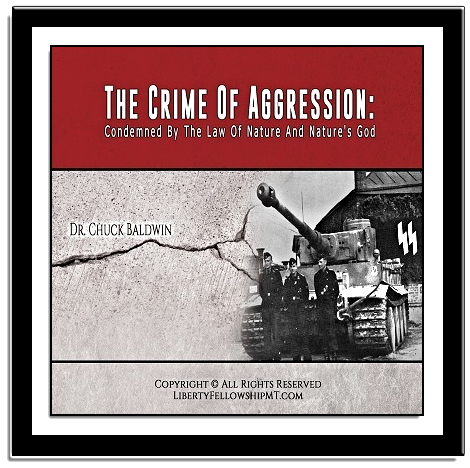
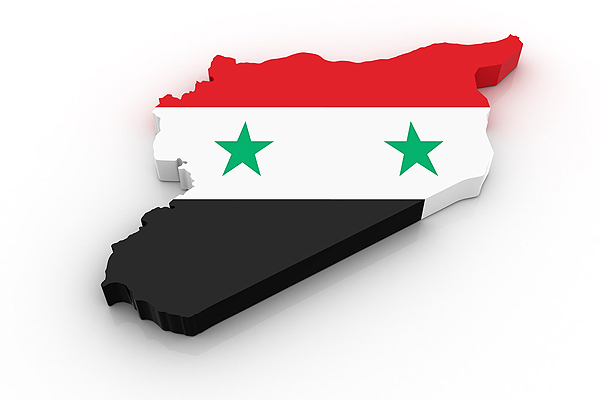
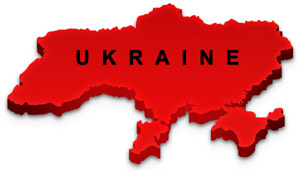


 “Burisma’s track record of innovations and industry leadership in the field of
natural gas means that it can be a strong driver of a strong economy in Ukraine. As a new member of the Board,
I believe that my assistance in consulting the Company on matters of transparency, corporate governance and
responsibility, international expansion and other priorities will contribute to the economy and benefit the
people of Ukraine,” the
“Burisma’s track record of innovations and industry leadership in the field of
natural gas means that it can be a strong driver of a strong economy in Ukraine. As a new member of the Board,
I believe that my assistance in consulting the Company on matters of transparency, corporate governance and
responsibility, international expansion and other priorities will contribute to the economy and benefit the
people of Ukraine,” the 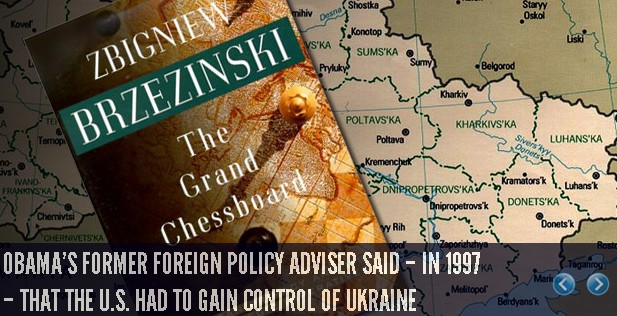
 In 1997, Obama’s former foreign affairs adviser, and president Jimmy Carter’s national
security adviser – Zbigniew Brzezinski – wrote a book called The Grand Chessboard arguing
arguing that the U.S. had to take control of Ukraine (as well as Azerbaijan, South
Korea, Turkey and Iran) because they were “critically important geopolitical pivots”.
In 1997, Obama’s former foreign affairs adviser, and president Jimmy Carter’s national
security adviser – Zbigniew Brzezinski – wrote a book called The Grand Chessboard arguing
arguing that the U.S. had to take control of Ukraine (as well as Azerbaijan, South
Korea, Turkey and Iran) because they were “critically important geopolitical pivots”.